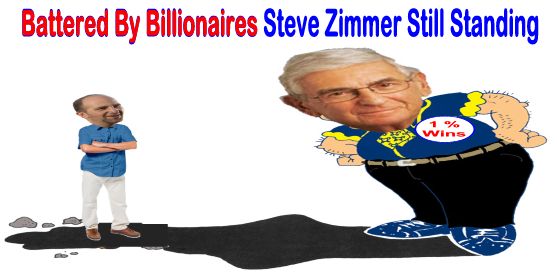L.A. school board candidates tackle questions on tenure, charter growth, graduation rates

n Tuesday, voters in two regions of Los Angeles will go to the polls in a pivotal school board election.
In one contest, school board President Steve Zimmer, 47, is facing challenger Nick Melvoin, a 31-year-old attorney who’s worked recently for groups trying to limit union influence and promote the growth of charter schools. They are vying to represent District 4, which stretches from the Westside to the west San Fernando Valley.
In District 6, in the east Valley, Imelda Padilla, 29, a community activist and labor organizer, is running against Kelly Gonez, 28, who teaches at a charter middle school. The winner will fill the seat of Monica Ratliff, who did not run for reelection.
None of the candidates has children.
Melvoin and Gonez are supported by charter-school advocates, Zimmer and Padilla by school-district employee unions.The campaign spending and messages have been dominated by supporters of charter schools on one side and teachers unions on the other.
Because it’s difficult to get past their overblown and false claims, The Times submitted the same questions to each candidate to clarify where they stand on some key issues.
Portions of their answers, along with some context, are presented below.
Exactly how, if at all, would you change the current tenure and seniority system? Should there be tenure at all? How long should it take to earn tenure? Should it have to be re-earned every few years? How should the layoff system be changed if all? Strictly seniority based? Strictly evaluation based?
Both Melvoin and Gonez favor extending the time required to earn tenure. Under state law, fully credentialed teachers can earn the strong job protections of tenure near the end of their second year in the job.
As far as the “last in, first out” rules for laying off teachers, Gonez supports “the formation of a commission with teachers, principals, parents and academics to look at what works best for the students, teachers and LAUSD as a whole.”
Padilla said she is open to new ideas to improve the tenure process, but hasn’t staked out a position. Regarding seniority, she said, “layoffs should not be strictly seniority based. I look forward to exploring a hybrid idea, but ideally I would look forward to managing the budget in a way that we would never have to deal with the pink-slip era again.”
Before attending law school, Melvoin worked for two years as a low-seniority teacher at L.A. Unified during a period of layoffs. As a result, his job was at risk and he had to work several months classified as a temporary teacher. He said he feels strongly that layoffs should be based on performance evaluations and not time on the job. He has participated in lawsuits to limit teacher seniority rights.
“Both teacher tenure and seniority-based hiring/firing systems need reform,” he said. “As a teacher in Watts, I had firsthand experience with these policies and fought for their revision. I remain concerned about the inherent inequities in how layoffs affect students as well as teachers.”
Zimmer said the district, during his tenure, developed rules that protect teachers with certain skills, and noted that the district subsequently agreed to protect schools that would be disproportionately harmed by layoffs.
Zimmer said he is open to extending the length of time needed to earn tenure but that other steps are more crucial to improving teachers’ skills and keeping high-quality teachers in the field of education.
“We need to make sure that training and support systems from universities are stronger and that we are broadcasting a positive image about the field of education,” he said. “And once a teacher is in the classroom, we need to offer continuing support and opportunities for career advancement without leaving the classroom.”
Melvoin, Gonez and Padilla agree, but Melvoin in particular places a greater emphasis on limiting current teacher job protections as a centerpiece of reform.
(Most tenure and seniority rules are part of the state education code, however, so L.A. L.A. school board candidates tackle questions on tenure, charter growth, graduation rates - LA Times:



